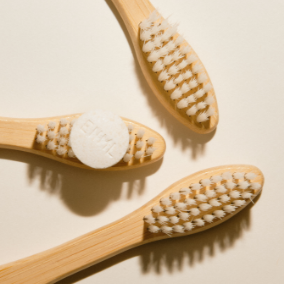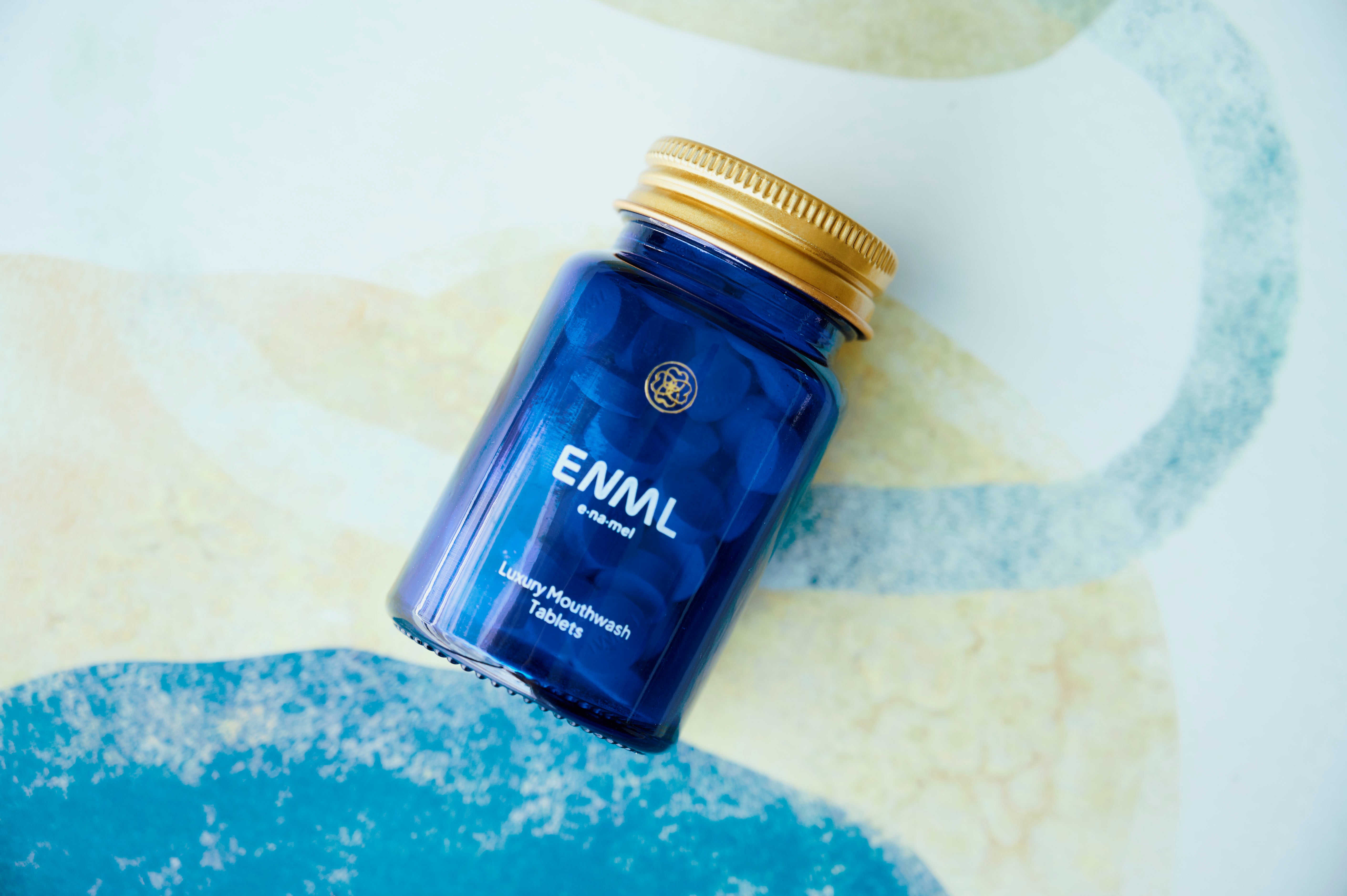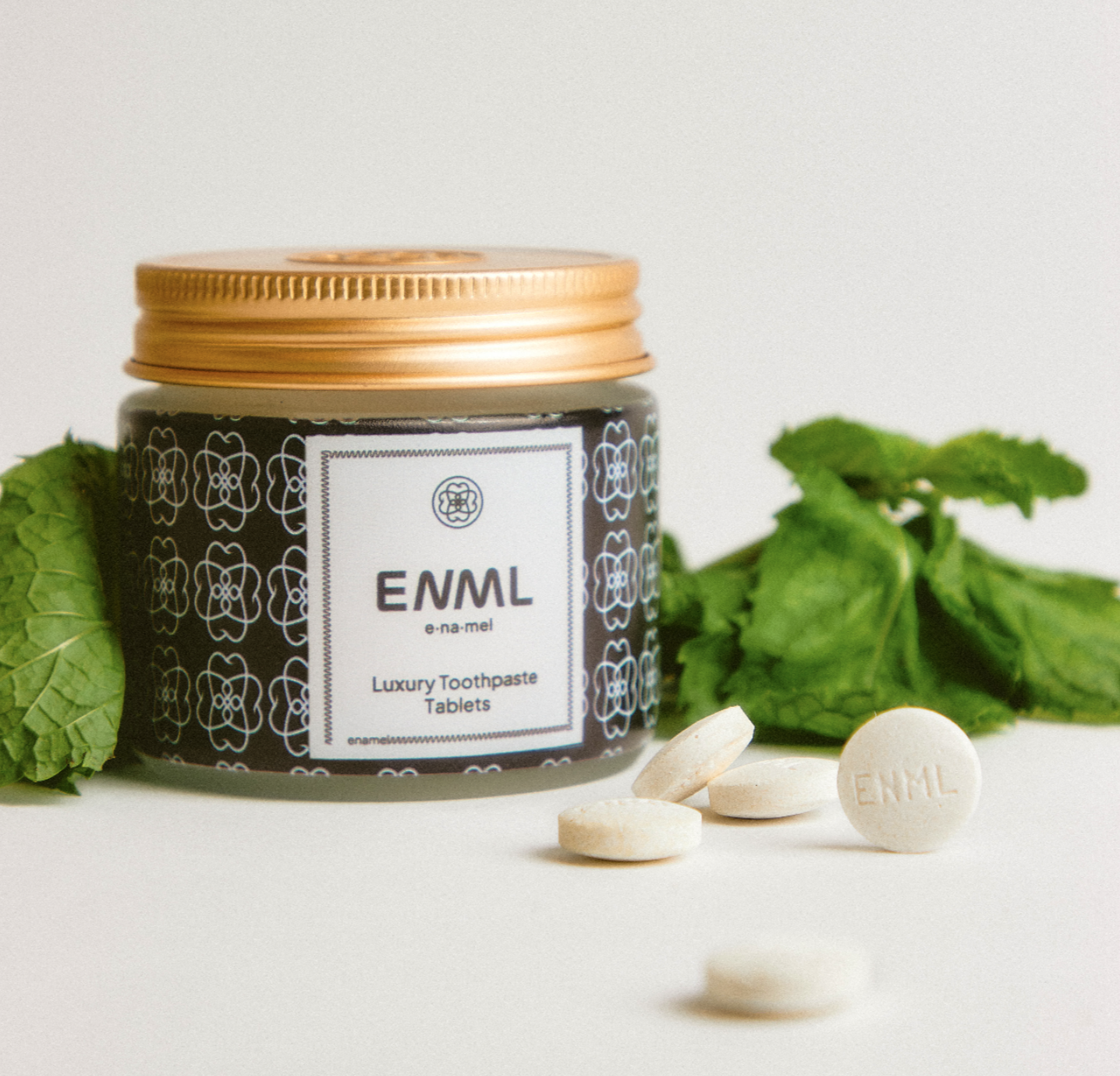ENML’s Mint Toothpaste Tablets
represent a cutting-edge approach to oral care, combining eco-friendly design with a scientifically grounded, wellness-oriented formulation. Developed by dentists and oral care experts, these fluoride-free tablets use a clean ingredient list focused on safety and efficacy. In this article, we introduce ENML’s mint toothpaste tablets and break down each ingredient’s function and benefits. We’ll explore how this non-GMO, non-nano silica toothpaste formula offers professional-level results – making it ideal for dentists, spa and wellness professionals, and ingredient-conscious consumers seeking a dentist-recommended toothpaste tablet brand.
Why Toothpaste Tablets and Clean Ingredients Matter
Toothpaste tablets are an innovative, eco-friendly alternative to traditional toothpaste tubes. By eliminating water and plastic packaging, ENML tablets offer a sustainable oral care solution without compromising performance. More importantly, every ingredient in the tablet is carefully selected to ensure clean oral care ingredients – free from harsh additives like SLS (sodium lauryl sulfate), parabens, or unnecessary fillers. This focus on purity and safety is crucial for professionals and informed consumers who demand evidence-based benefits from the products they recommend or use daily.
Dentists appreciate that ENML’s formulation is backed by research on remineralization and antimicrobial efficacy, while wellness experts value the non-toxic, non-GMO, and gentle nature of the ingredients. From fluoride-free hydroxyapatite toothpaste technology that strengthens enamel to natural sweeteners that prevent cavities, ENML’s tablets align with the latest trends in oral health science and clean beauty. Below, we provide a comprehensive ingredient breakdown and explain how each component contributes to oral wellness, especially in the convenient tablet format.
Ingredient Breakdown and Benefits
Each ingredient in ENML’s mint toothpaste tablets serves a specific purpose for oral health or tablet integrity. The following table highlights the key ingredients, their source or special attributes, and their functionality in this non-GMO toothpaste tablet formulation:
| Ingredient | Source/Quality | Role & Oral Health Benefit |
|---|---|---|
| Sorbitol (DC) | From non-GMO corn starch (natural polyol) | Sweetener and binder; provides pleasant taste and moisture, non-cariogenic (does not cause cavities). Helps tablets dissolve and foam. |
| Microcrystalline Cellulose (MCC) | Plant-derived fiber (wood pulp), inert | Tablet binder and mild abrasive; gives structure and gentle cleaning power by helping remove plaque. Inert and safe for daily use. |
| Xylitol (DC) | Natural sugar alcohol (birch/corn sources) | Sweetener with anticaries benefits; inhibits decay-causing bacteria. Xylitol reduces Streptococcus mutans levels in plaque and saliva, helping prevent cavities. Also adds a pleasant sweetness. |
| Erythritol | Fermented natural polyol (fruit-derived) | Sweetener and humectant; enhances flavor. Also anti-cavity: studies show erythritol can reduce dental plaque weight and bacteria adherence, even outperforming xylitol in oral health efficacy. |
| Sodium Bicarbonate | Natural mineral (baking soda) | Gentle abrasive and alkalizer; helps whiten teeth and neutralize acids. Baking soda provides low-abrasion scrubbing to remove stains and plaque, and neutralizes acids to reduce harmful bacteria. Supports fresher breath and healthier pH. |
| Calcium Carbonate (DC) | Purified mineral (chalk) in direct-compressible form | Mild abrasive and calcium source; polishes teeth and helps remove plaque. Calcium carbonate also provides calcium ions that can assist remineralization of enamel when used alongside hydroxyapatite. |
| Hydroxyapatite | Synthetic enamel mineral (nano form, fluoride-free) | Enamel remineralizer; the same mineral as natural tooth enamel. Hydroxyapatite particles deposit onto demineralized enamel to restore and strengthen it, offering a fluoride-free anti-caries approach. Helps fill microscopic tooth defects and reduce sensitivity. |
| Zinc Citrate | Zinc salt of citric acid, food grade | Antimicrobial and anti-plaque agent; zinc ions combat the bacteria that cause plaque and gum inflammation. Shown to reduce plaque formation and improve gingival health. Also helps neutralize odor for fresher breath by targeting volatile sulfur compounds. |
| Sodium Cocoyl Glycinate | Coconut-derived amino acid surfactant (not ethoxylated) | Gentle foaming cleanser; lowers surface tension for cleaning. Unlike SLS, this surfactant is not ethoxylated – meaning it’s free of 1,4-dioxane contamination risk. Provides a mild foam to lift away debris without irritating tissues. |
| Spearmint & Peppermint Oils | Natural mint essential oils | Flavor and mild antimicrobial effect; give a refreshing mint taste and cooling sensation. Mint oils also have modest antibacterial properties against oral bacteria, contributing to fresh breath and a “spa-like” refreshing experience. |
| Menthol | Natural mint extract (peppermint) | Cooling active from mint that enhances freshness. Soothes the mouth and throat, and reinforces the mint flavor. Also contributes a slight antiseptic quality and post-brush tingly “clean” feeling. |
| Stevia | Natural leaf extract (Stevia rebaudiana) | Natural non-sugar sweetener; intensifies sweetness without calories or cavities. Stevia ensures a pleasant taste profile so the formula is palatable, especially important for those avoiding artificial sweeteners. It is non-cariogenic (does not feed oral bacteria). |
| Silicon Dioxide (Silica) | Evonik AEROSIL® 200 (synthetic amorphous silica) | Polishing agent and anticaking; a fine amorphous silica that safely boosts cleaning and keeps the tablet dry. It’s non-crystalline and non-nano (forms larger agglomerates), so it safely polishes without the risks of inhalable crystalline silica. Adds gentle abrasion for stain removal and ensures ingredients flow well in manufacturing. |
| Magnesium Stearate | Synthetic magnesium salt of stearic acid (palm-free) | Tablet lubricant; ensures powder blends compress smoothly and tablets eject cleanly. Synthetic source means no hydrogenated oils or palm derivatives, aligning with non-GMO and sustainability values. Magnesium stearate is inert and safely used in small amounts as a pharmaceutical-grade excipient (GRAS by FDA). |
(DC = Directly Compressible grade, optimized for tablet forming)
As shown above, ENML’s ingredient list reads like a “who’s who” of dentist-approved and wellness-friendly materials. Each component serves a clear purpose in enhancing oral health or the user experience. In the following sections, we highlight some of the key ingredients and why they set ENML apart as a clean yet effective toothpaste tablet.
Non-Nano Silica for Safe Polishing
One standout in ENML’s formulation is the use of non-nano, amorphous silica as a polishing agent. Many conventional toothpastes use hydrated silica for abrasion, but ENML goes a step further by ensuring the silica meets stringent safety criteria. The silicon dioxide used (Evonik AEROSIL® 200) is a synthetic amorphous silica (SAS) with an ultrafine particle structure that is aggregated into larger clumps. This means it is nanostructured but not free “nanoparticles” in the final form. Why is this important? Because regulatory bodies like the EU define a “nanomaterial” largely by particle size (1–100 nm range) and whether particles exist as isolated nanoscale entities. ENML’s silica, while extremely fine, does not exist as separate nano-particles; instead, the primary nano-sized units are strongly bound in agglomerates above the nano range.
From a safety and professional standpoint, this offers two major advantages:
-
Non-Crystalline = Safe for Lungs and Gums: The silica is confirmed to be non-crystalline, meaning it lacks the sharp, jagged structure of crystalline silica (quartz) that can cause silicosis or irritation. Amorphous silica has been used for decades as a food additive (E551) and is deemed safe by EFSA and other authorities. Dentists can confidently recommend ENML tablets knowing the abrasive won’t harm enamel or health when used as directed.
-
Effective Polishing Without “Nano” Concerns: As a non-nano silica toothpaste, the formulation avoids any potential consumer concern over nano-particles. The EU’s expert review has noted that synthetic amorphous silicas like this do not classify as nanomaterials under cosmetic and food regulations. In practical terms, ENML’s silica safely removes stains and plaque like any modern toothpaste, but with a reassurance that it’s a trusted, inert ingredient with a long history of safe use.
For the user, the silica contributes to that “dentist-clean” smooth feel on teeth after brushing – gently buffing away debris to reveal a natural shine. It works in tandem with mild abrasives like calcium carbonate and baking soda to deliver effective whitening without excessive abrasivity. In fact, baking soda (sodium bicarbonate) in the formula further ensures a low-abrasion polish and helps neutralize acids, which studies show can reduce plaque and gum inflammation. The result is a tablet that cleans and whitens effectively yet safely – a key reason why dentists and hygienists are embracing toothpaste tablets like ENML as a viable alternative in professional oral care recommendations.
Hydroxyapatite: Fluoride-Free Enamel Remineralization
One of the most exciting ingredients in ENML’s mint toothpaste tablets is nano-hydroxyapatite (HAp) – a mineral that is literally the building block of natural tooth enamel. Hydroxyapatite has emerged as a revolutionary fluoride-free toothpaste ingredient for remineralizing and strengthening teeth. ENML leverages this advanced ingredient to make its tablets genuinely functional for enamel repair and cavity prevention.
Hydroxyapatite works by depositing onto the tooth surface and filling in microscopic demineralized areas. Research confirms that hydroxyapatite particles in micro or nanocrystalline form bind to and restore demineralized enamel surfaces, essentially re-mineralizing the tooth. Over time, this can help rebuild a smoother, harder enamel surface, making teeth more resistant to acid attack. Notably, hydroxyapatite is so effective that it’s being explored as a fluoride-free anti-caries agent, with studies showing it can be as good as or even better than traditional low-dose fluoride in remineralization outcomes.
For dentists and informed consumers concerned about fluoride (whether due to young children swallowing toothpaste, personal health preferences, or fluorosis risk), ENML’s inclusion of hydroxyapatite offers a science-backed alternative. Nano-hydroxyapatite has significant remineralizing effects on initial enamel lesions and can reduce sensitivity by occluding open dentin tubules (much like how fluoride would encourage fluorapatite formation, hydroxyapatite literally adds mineral back into the tooth structure). In Japan, hydroxyapatite has been used in toothpastes for decades as an approved anti-cavity ingredient, and it’s gaining global acceptance as more studies demonstrate its efficacy:
-
A 2019 study showed hydroxyapatite toothpaste remineralized and repaired early carious lesions in children’s teeth comparably to fluoride toothpaste.
-
Other in vitro studies have found nano-hydroxyapatite can remineralize enamel and dentin, and even reduce bacterial adhesion on the tooth surface due to its calcium-phosphate rich presence.
By formulating with hydroxyapatite, ENML ensures that even without fluoride, users are actively strengthening their enamel with each brush. This is a major selling point for wellness professionals and dental practitioners who seek fluoride-free hydroxyapatite toothpaste options for patients that still deliver cavity-fighting benefits. It aligns with a growing trend of dentist-recommended toothpaste tablets that use HAp for remineralization in a more natural, biocompatible way.
Xylitol and Erythritol: Sweetness with Cavity-Fighting Benefits
Rather than using sugar or artificial sweeteners, ENML’s mint tablets are sweetened with natural sugar alcohols – primarily xylitol and erythritol (plus a touch of stevia). These not only provide a pleasant, minty-sweet flavor but also contribute to oral health:
-
Xylitol is well-known in dentistry for its anti-cavity properties. It’s a sweetener that oral bacteria cannot ferment into acids. Xylitol use has been shown to reduce levels of mutans streptococci (cavity-causing bacteria) in plaque and saliva. By disrupting bacterial metabolism, xylitol creates a futile energy cycle for the bacteria, leading to less acid production and a lower risk of tooth decay. Many dentists recommend xylitol gum or toothpaste for patients with high cavity risk; ENML’s inclusion of xylitol aligns with these preventive strategies. It helps make the tablet not just neutral for teeth, but actually protective against caries over time.
-
Erythritol is another naturally derived polyol (often from fermenting fruits or corn) that has gained attention for oral care. Emerging evidence suggests erythritol may be even more effective than xylitol in reducing plaque and cavities. For instance, one comprehensive review found that erythritol decreased dental plaque weight, inhibited Streptococcus mutans, and overall reduced caries more than xylitol or sorbitol. Erythritol also has a cooling taste and high digestibility (it doesn’t cause gastric upset like some polyols), making it an excellent sweetener for toothpaste tablets. In ENML’s formula, erythritol works synergistically with xylitol to create an inhospitable environment for cavity bacteria while giving a smooth, sweet taste with no sugar.
Both xylitol and erythritol are non-GMO (when sourced properly) and do not raise blood sugar or feed oral yeast – they are truly “tooth-friendly” sweeteners. For ingredient-conscious consumers, seeing these names on the label is reassuring, as it means the product is free from fermentable sugars and even offers proactive defense against tooth decay. The sweetness is rounded out by stevia, a plant-derived zero-calorie sweetener that ensures the tablets taste good without any sugar. Stevia is also non-cariogenic, keeping the formulation 100% free of sugars that harm teeth.
Gentle Foaming with Sodium Cocoyl Glycinate (No SLS or 1,4-Dioxane)
A common concern with many toothpaste formulas is the use of harsh foaming agents like SLS (sodium lauryl sulfate), which can cause mouth irritation or canker sores in some individuals. ENML avoids SLS entirely, opting for sodium cocoyl glycinate – a gentle surfactant derived from coconut fatty acids and the amino acid glycine. This choice reflects a “clean cosmetics” approach to oral care formulation:
-
Mild yet Effective Cleansing: Sodium cocoyl glycinate creates a mild foam that helps disperse the toothpaste ingredients and lift away food particles and plaque. Users will still enjoy a foamy, satisfying brushing experience, but without the risk of the foam stripping the delicate mucous membranes or leaving an aftertaste. It’s often used in premium skin cleansers for its gentleness, so it’s very well-suited to oral care for those with sensitive mouths.
-
No Ethoxylation (No 1,4-Dioxane): Importantly, this surfactant is not ethoxylated. Ethoxylation is a chemical process used to make certain surfactants (like SLES – sodium laureth sulfate) more soluble, but it can generate 1,4-dioxane as a byproduct. 1,4-Dioxane is a suspected carcinogenic contaminant that has prompted concern and even regulation in some regions. By using sodium cocoyl glycinate, which is made by a simple condensation reaction (coconut oil + glycine) with no ethylene oxide involved, ENML ensures there is zero risk of 1,4-dioxane contamination in the toothpaste tablets. This is a significant safety and purity advantage, aligning with the strict standards that wellness spas and holistic health stores often require. You can confidently say these tabs have “no hidden nasties.”
The result is a cleansing system that is biocompatible and non-drying. Patients with recurrent mouth ulcers, dry mouth, or past SLS sensitivity can use ENML tablets without worry. The absence of harsh detergents also means the formula maintains a neutral pH (helped by baking soda) during brushing, which is kinder to enamel and oral microbiome balance. For dentists focused on overall oral tissue health, this gentle approach to foam is a welcome innovation.
Zinc Citrate for Gum Health and Fresh Breath
ENML’s inclusion of zinc citrate elevates the toothpaste tablets from just cleaning the teeth to also actively caring for the gums. Zinc is a trace mineral with well-documented benefits in oral care products:
-
Antibacterial and Anti-Plaque: Zinc ions interfere with the growth of oral bacteria and the formation of biofilm. Clinical studies have shown that toothpastes containing zinc (such as zinc citrate at ~2%) can reduce the viability of plaque bacteria and slow plaque accumulation. Zinc citrate specifically has demonstrated an ability to inhibit dental plaque and tartar formation and reduce gingival inflammation. By breaking down plaque’s bacterial matrix and inhibiting calculus crystal growth, it helps keep the gumline cleaner.
-
Reduces Gingivitis and Bleeding: By curbing bacterial irritants, zinc can lower gingival index scores (a measure of gum inflammation). Users of zinc toothpaste often experience less gum bleeding over time. This makes ENML tablets attractive for those with gum sensitivity or those prone to gingivitis. Dentists will note that adding zinc is a smart move to support periodontal health in a daily toothpaste.
-
Odor Neutralizing: A bonus of zinc is its ability to neutralize volatile sulfur compounds produced by bacteria (which cause bad breath). In essence, zinc deodorizes the mouth, contributing to longer-lasting fresh breath after brushing. This is why many mouthwashes contain zinc. In ENML’s tablets, the zinc works alongside the peppermint/menthol to keep breath fresh in a more lasting, clinical way than flavor alone.
By addressing gum health, ENML tablets position themselves not just for cavity prevention but for comprehensive oral hygiene. This appeals to dental professionals who understand that healthy gums are the foundation of overall oral wellness. It also resonates with spa owners or wellness advocates who can tout that this one product helps with fresh breath, white teeth, and pink healthy gums – a full-mouth approach.
Thoughtfully Selected Binders and Flavors (Safe and Natural)
Every supporting ingredient in the ENML formula is chosen with the same care for safety and efficacy:
-
Microcrystalline Cellulose (MCC): As noted, MCC is a plant-fiber based binder that holds the tablet together and doubles as a gentle cleaning agent. It is chemically inert and has excellent safety (commonly used in tablets and even food). Its mild abrasive quality helps the overall polishing effect, but it’s much softer than silica or carbonate, ensuring low abrasivity. MCC also gives a satisfying mouthfeel – it isn’t gritty, so as the tablet breaks down, the texture remains smooth.
-
Magnesium Stearate: Often a misunderstood ingredient, magnesium stearate is simply a salt of magnesium and stearic acid. ENML uses a synthetic magnesium stearate which means it’s not sourced from palm oil or GMOs (many “vegetable magnesium stearate” sources use hydrogenated soybean or palm oils). The synthetic version is highly pure and actually avoids the use of any allergens or impurities. It’s used in a very small amount as a lubricant in the tablet – allowing the powders to compress without sticking to the tablet press. This ensures consistent tablet quality and prevents chipping or crumbling. Importantly, magnesium stearate is Generally Recognized as Safe (GRAS) and has no physiological effect at the tiny amounts here – it simply ensures you get a nice intact tablet that feels silky on the tongue as it starts to dissolve.
-
Natural Flavors (Peppermint, Spearmint, Menthol, Stevia): The flavor profile of ENML tablets is entirely derived from natural sources – peppermint and spearmint essential oils, along with menthol (a cooling extract from mint). This gives a refreshing burst of flavor that makes brushing enjoyable (crucial for compliance). Beyond taste, peppermint oil has mild antiseptic properties and can stimulate saliva, aiding in natural cleansing. Spearmint offers a sweeter mint note to balance peppermint’s intensity. Menthol provides that clean, cooling sensation that signals freshness. Finally, a touch of stevia extract enhances the sweetness without any sugar or artificial chemicals. The result is a minty fresh flavor that rivals any conventional toothpaste – an important factor for both patient acceptance and spa-like indulgence.
Together, these binders and flavors ensure that ENML’s tablets are functional, stable, and pleasant to use. The tablets hold up in storage and transit (thanks to the binders and silica keeping them dry), yet they readily crumble with a few bites and some water when you’re ready to brush. The all-natural flavor system leaves no bitter aftertaste – just a lingering mint freshness.
High-Authority Backing and Professional Appeal
ENML Mint Toothpaste Tablets are formulated at the intersection of scientific research and holistic wellness principles. Every ingredient choice is backed by either dental research, regulatory safety approvals, or both. This results in a product that can proudly be recommended by dentists and hygienists, knowing it delivers on remineralization, plaque control, and overall oral health maintenance. At the same time, wellness professionals can endorse it for what it doesn’t contain – no fluoride, no SLS, no artificial sweeteners, no GMO ingredients, and no unnecessary additives.
By focusing on biocompatible and sustainable components, ENML has created a dentist-trusted, clean oral care solution. The tablets meet the needs of today’s ingredient-conscious consumers who scrutinize labels and seek transparency. For example, a spa owner can assure clients that the “non-nano silica” means no hidden nanotech risks and that the “non-GMO sorbitol” means even the sweet base is natural and ethically sourced.
Moreover, the product aligns with regulatory definitions and safety standards:
-
The silica meets EU criteria for not being a nanomaterial and is food-grade safe.
-
The surfactant choice dodges any California Prop 65 concerns about 1,4-dioxane.
-
The ingredients like hydroxyapatite and zinc citrate are already used in professional-grade toothpastes and have literature supporting their use as effective, safe oral care actives.
From an SEO perspective, ENML’s mint toothpaste tablets hit all the keywords that informed consumers and professionals are searching for: “non-nano silica toothpaste” (for those worried about nanoparticle safety), “non-GMO toothpaste tablets” (for the natural product community), “fluoride-free hydroxyapatite toothpaste” (for those seeking the latest in remineralization tech), “clean oral care ingredients” (for the clean beauty movement), and “dentist-recommended toothpaste tablet brand” (for those looking for professional endorsements of eco-friendly oral care). ENML is positioning itself as a leader in this space, providing an answer to all these queries in one product.
Conclusion: Innovation in Oral Care You Can Trust
In summary, ENML’s mint toothpaste tablets offer a powerful combination of professional-grade efficacy and clean, safe formulation. Each ingredient – from remineralizing hydroxyapatite to plaque-fighting zinc and cavity-preventing xylitol – plays a deliberate role in promoting oral health. The avoidance of common toothpaste nasties (no fluoride, no SLS, no artificial additives) reflects a modern understanding of consumer health priorities, without sacrificing the quality of oral care. This makes ENML a brand that dentists, wellness experts, and savvy consumers can all get behind.
By choosing ENML toothpaste tablets, you’re embracing a holistic approach to oral hygiene: one that cares for your teeth and gums with scientifically proven ingredients, while also caring for your overall well-being and the planet (thanks to its sustainable, waterless format). It’s a refreshing, minty at-home spa for your smile – delivering that dentist-clean feeling with an ingredient list you can feel good about.
References:
-
Evonik Industries – Synthetic Amorphous Silica (SAS) is a highly pure, non-crystalline form of silica; Evonik SAS does not contain isolated nanoparticles... consists of aggregates which form larger agglomerates; Does not classify as a nanomaterial under EU regulations.
-
EU Commission – Nanomaterial is a categorization by size... not necessarily an indicator of new hazard (confirming non-nano silica safety perspective).
-
Teknoscienze, What’s all the fuss about 1,4-Dioxane? – 1,4-dioxane is formed as a trace by-product during manufacture of certain ethoxylated surfactants, especially SLES. ENML avoids ethoxylation to stay 1,4-dioxane-free.
-
Janakiram et al. (2017) – Xylitol reduces levels of mutans streptococci (MS) in plaque and saliva, contributing to fewer cavities.
-
de Cock et al. (2016) – Erythritol effectively decreased dental plaque and inhibited Streptococcus mutans... better efficacy than xylitol to improve oral health.
-
O’Hagan-Wong et al. (2022) – Hydroxyapatite toothpastes (micro- or nanocrystalline) deposit and restore demineralized enamel surfaces, being explored as a fluoride-free anti-caries agent.
-
Jungbunzlauer White Paper (2014) – Zinc citrate displays anti-microbial and anti-inflammatory effects; shown to reduce or inhibit formation of dental plaque and tartar with positive effects on gingivitis.
-
VerywellHealth (2023) – Baking soda is a low-abrasive cleanser that can reduce plaque and gingivitis, neutralizing acids from bacteria.
-
Extrapolate (2023) – Microcrystalline cellulose can act as a mild abrasive agent in toothpaste, helping remove plaque and debris from teeth, while being inert and safe.




